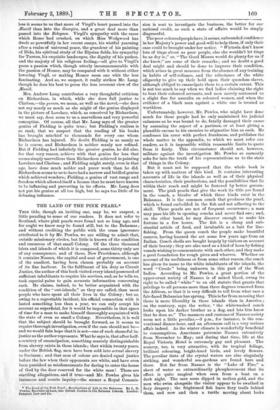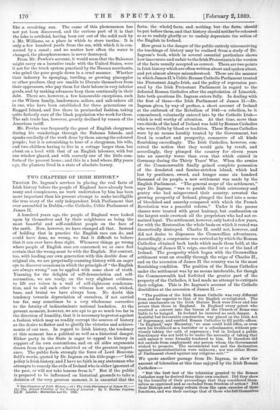THE LAND OF THE PINK PEARL.*
THIS title, though an inviting one, may be, we suspect, a little puzzling to some of our readers. It does not refer to Scotland, where pink pearls were found not so long ago, and for aught we know may be found still, but to the Bahamas ; and without crediting the public with the crass ignorance attributed to it by Mr. Powles, we are willing to admit that, outside missionary circles, but little is known of the condition and resources of that small Colony. Of the three thousand islets and islands of which it is composed, some thirty only are of any consequence, and of these, New Providence, although it contains Nassau, the capital and seat of government, is one of the smallest, having been chosen probably on account of its fine harbour. In the fulfilment of his duty as Circuit Justice, the author of this book visited every island possessed of sufficient inhabitants to require his services, and, as he tells us, took especial pains to gain accurate information concerning each. He claims, indeed, to be better acquainted with the condition of the "out-islands," as they are called, than most people who have spent all their lives in the Colony; but as, owing to a regrettable incident, his official connection with it lasted something less than a year, we can only accept his account as superficial, for it would be impossible in that space of time for a man to make himself thoroughly acquainted with the state of even so small a Colony. Nevertheless, it is well that the subject should be brought forward, as it seems to require thorough investigation, even if the case should not be— and we would fain hope that it is not—one of such shameful in- justice as the author represents. What he says is, that *after h alf- a-century of emancipation, something scarcely distinguishable from slavery exists in these islands; that within twenty years, under the British flag, men have been sold into actual slavery to Surinam ; and that men of colour are denied equal justice before the law when their opponents are white, and have even been punished as misdemeanants for daring to enter the house of God by the door reserved for the white man' These are startling allegations, and if true—and Mr. Powles gives his instances and courts inquiry—the sooner a Royal Commis- • The Lend of ths Pink Pearl Recollections of Life in the Bahamas. By L. D. Powles, Barrister-atLaw, late Circuit Justice in the Bahama Ishuida. London: Sampson Low and Co.
sion is sent to investigate the business, the better for our national credit, as such a state of affairs would be simply disgraceful.
The poor coloured people have, it seems, unbounded confidence in her Majesty's power and good-will to help them, if only their case could be brought under her notice. " Wictoria don't know lots of tings about us poor people, else she wouldn't let tinge be as dey is ;" or, "The Good Misses would do plenty for us if she knew," are some of their remarks ; and no doubt a good deal might and should be done to improve their condition, which arises in great measure from the absence of any training in habits of self-reliance, and the reluctance of the white oligarchy to give up their hold upon their quondam slaves, although obliged to emancipate them to a certain extent. This is not too much to say when we find ladies claiming the right to beat their coloured servants, and men merely sentenced to a slight fine for assaults on coloured women, and when the evidence of a black man against a white one is treated as worthless.
Unfortunately, however, Mr. Powles, who might have done much for these people had he only maintained his judicial calmness as he was bound to do, fatally damaged their cause by assuming the aspect of a partisan, or at least giving a plausible excuse to his enemies to stigmatise him as such. He confesses his error with perfect frankness, and publishes the whole matter in the appendix, to which we must refer our readers, as it is impossible within reasonable limits to quote from it fairly. This circumstance should not, however, militate against the investigation Mr. Powles so earnestly asks for into the truth of his representations as to the state of things in the Colony. But it must not be supposed that the whole book is taken up with matters of this kind. It contains interesting accounts of life in the islands as well as of their physical characteristics, their productions, and the possibilities that lie within their reach and might be fostered by better govern- ment. The pink pearls that give the work its title are found in the conch, a bivalve of which three kinds exist in the Bahamas. It is the common conch that produces the pearl, which is found embedded in the fish and not adhering to the shell. These pearls are not of frequent occurrence ; a man may pass his life in opening conchs and never find one ; and, on the other hand, he may discover enough to make his fortune in a few hours. The fish is a cheap and sub- stantial article of food, and invaluable as a bait for line- fishing. From the queen conch the people make beautiful cameos, having learned the art some few years ago from an Italian. Conch shells are bought largely by visitors on account of their beauty; they are also used as a kind of horn by fishing vessels wishing to communicate with each other, and they make a good foundation for rough piers and wharves. Whether on account of its usefulness or from some other reason, the conch has given its name to the white inhabitants of the islands, the word " Creole " being unknown in this part of the West Indies. According to Mr. Powles, a great portion of the upper-crust society of Nassau is of mixed blood, owing its right to be called " white " to an old statute that grants that privilege to all persons more than three degrees removed from the African, so that it is very difficult to tell from what race a fair-faced Bahamian has sprung. This is far from meaning that there is more liberality in these islands than in America ; on the contrary, says the writer, "the whitewashed conch looks upon his darker brother as a dog, and lets him know that he does so." The manners and customs of Nassau society seem not a little peculiar,-3 p.m., for instance, is the con- ventional. dinner-hour, and an afternoon call is a very serious affair indeed. As the winter climate is wonderfully beneficial to consumptives, Americans patronise Nassau extensively from November to May; and during that time, life at the Royal Victoria Hotel is extremely gay and pleasant. The scenery, too, is very attractive, with its tropical foliage, brilliant colouring, bright-hued birds, and lovely flowers. The peculiar tints of the crystal waters are also singularly striking, and wonderful sea-gardens are found here and there. Not far from Nassau is the "Lake of Fire," a. sheet of water so extraordinarily phosphorescent that its effect is quite magical when seen from a boat on a dark night. The oars seem dipped in molten gold, and the men who swim alongside the visitor appear to be swathed in fiery drapery ; the frightened fish leave fiery trails behind them, and now and then a turtle moving about looks like a revolving sun. The cause of this phenomenon has not yet been discovered, and the curious part of it is that the lake is artificial, having been cut out of the solid rock by a Mr. Williams, as a place in which to store turtles. It is only a few hundred yards from the sea, with which it is con- nected by a canal ; and no matter how often the water is changed, the phosphorescence is never destroyed.
From Mr. Powles's account, it would seem that the Bahamas might carry on a lucrative trade with the United States, were it not for the truck system practised by the Nassau merchants, who grind the poor people down in a cruel manner. Whether their industry be sponging, turtling, or growing pineapples or other produce, they are unable to liberate themselves from their oppressors, who pay them for their labour in very inferior goods, and by making advances keep them continually in their debt. There are, however, a, few honourable exceptions, such as the Wilson family, landowners, sailors, and salt-rakers all in one, who have been established for three generations on Ragged Island, and live there in patriarchal fashion, taking quite fatherly care of the black population who work for them. The salt trade has, however, greatly declined by reason of the American tariff.
Mr. Powles was frequently the guest of English clergymen during his wanderings through the Bahama Islands, and speaks cordially of the work done by them among the coloured people; but it is astonishing to hear of a clergyman, his wife, and two children having to live in a cottage larger than, but about on a level with that of an English labourer, with but one window glazed, and with scarcely one of the little com- forts of the poorest home ; and this in a land where, fifty years ago, the planters lived in a state of absolute luxury.



































 Previous page
Previous page